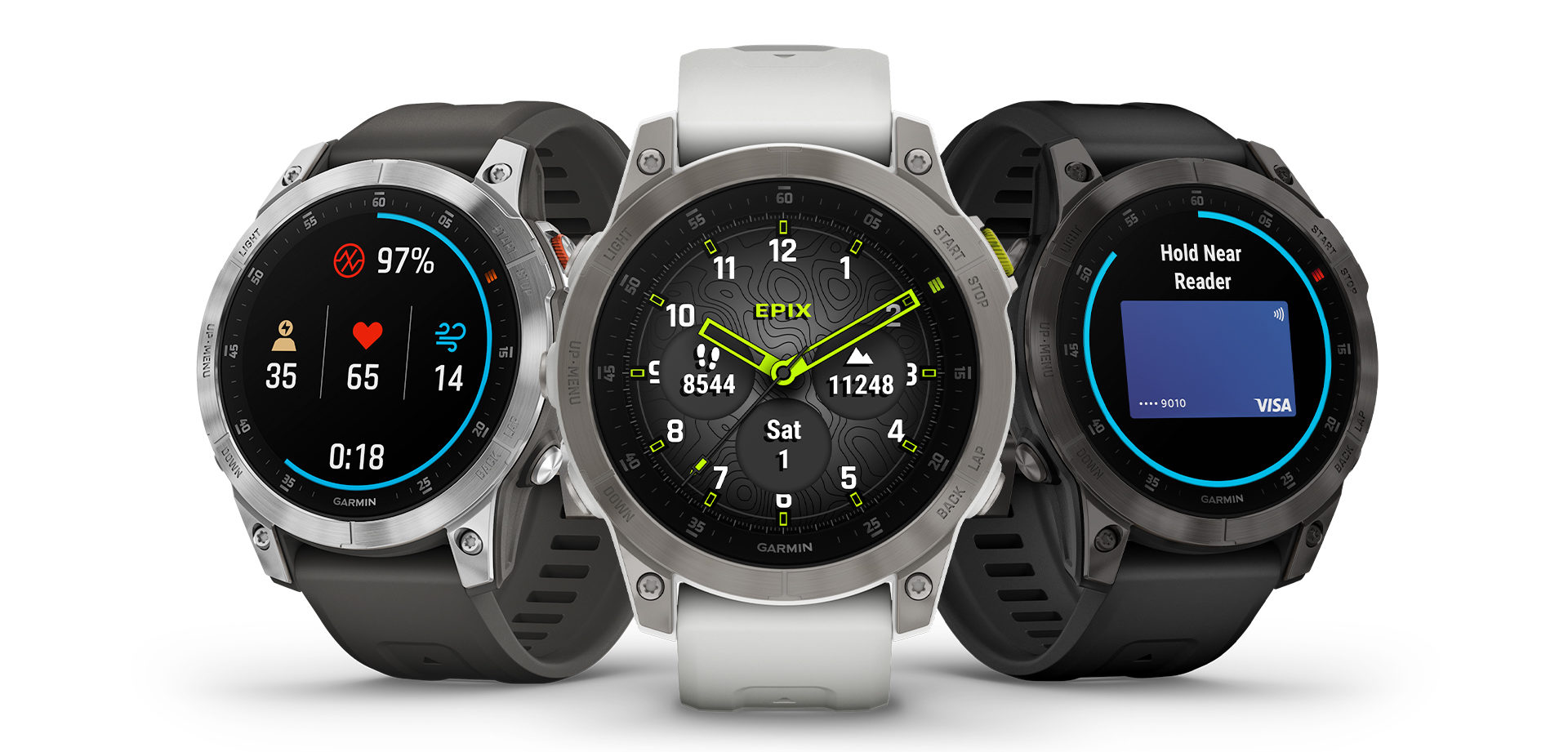Affiliate links on Android Authority may earn us a commission. Learn more.
Everything you need to know about the new Garmin Fenix 7 and Epix series
Published onFebruary 18, 2022
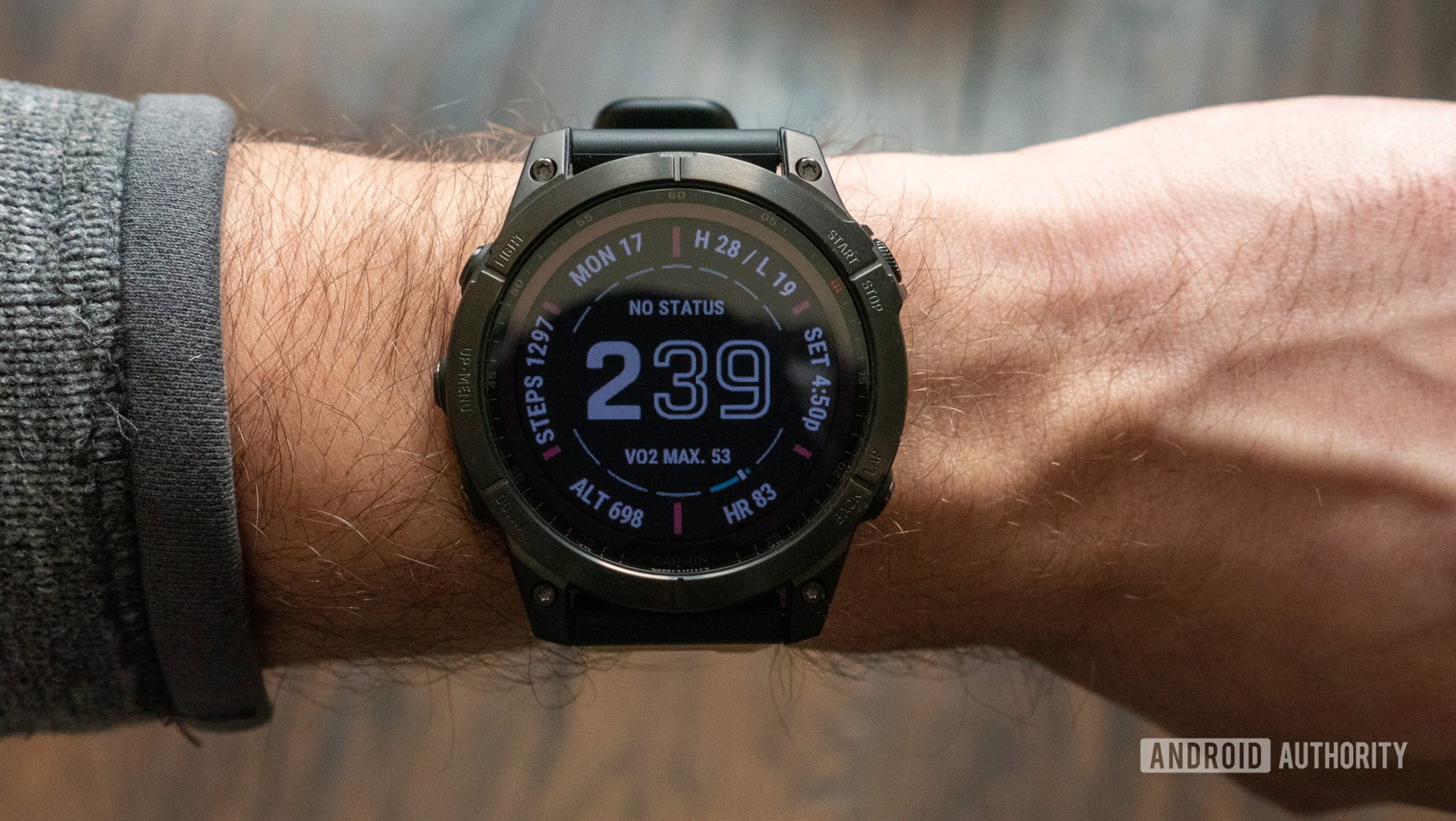
Garmin has announced a major update to some of its most popular devices. The Garmin Fenix 7 series is here, bringing more solar-powered models, touchscreen displays, and even built-in flashlights to the high-end GPS watch line. The company has also announced a (mostly) new series of fitness watches, called the Garmin Epix, which adds an AMOLED display to the Fenix 7 line.
There’s a lot to talk about with these devices, and we have all the details on the new features. Here’s everything you need to know about the Garmin Fenix 7 and Epix series.
Don’t miss: The complete Garmin wearables buyer’s guide
Garmin Fenix 7 series: What’s new?
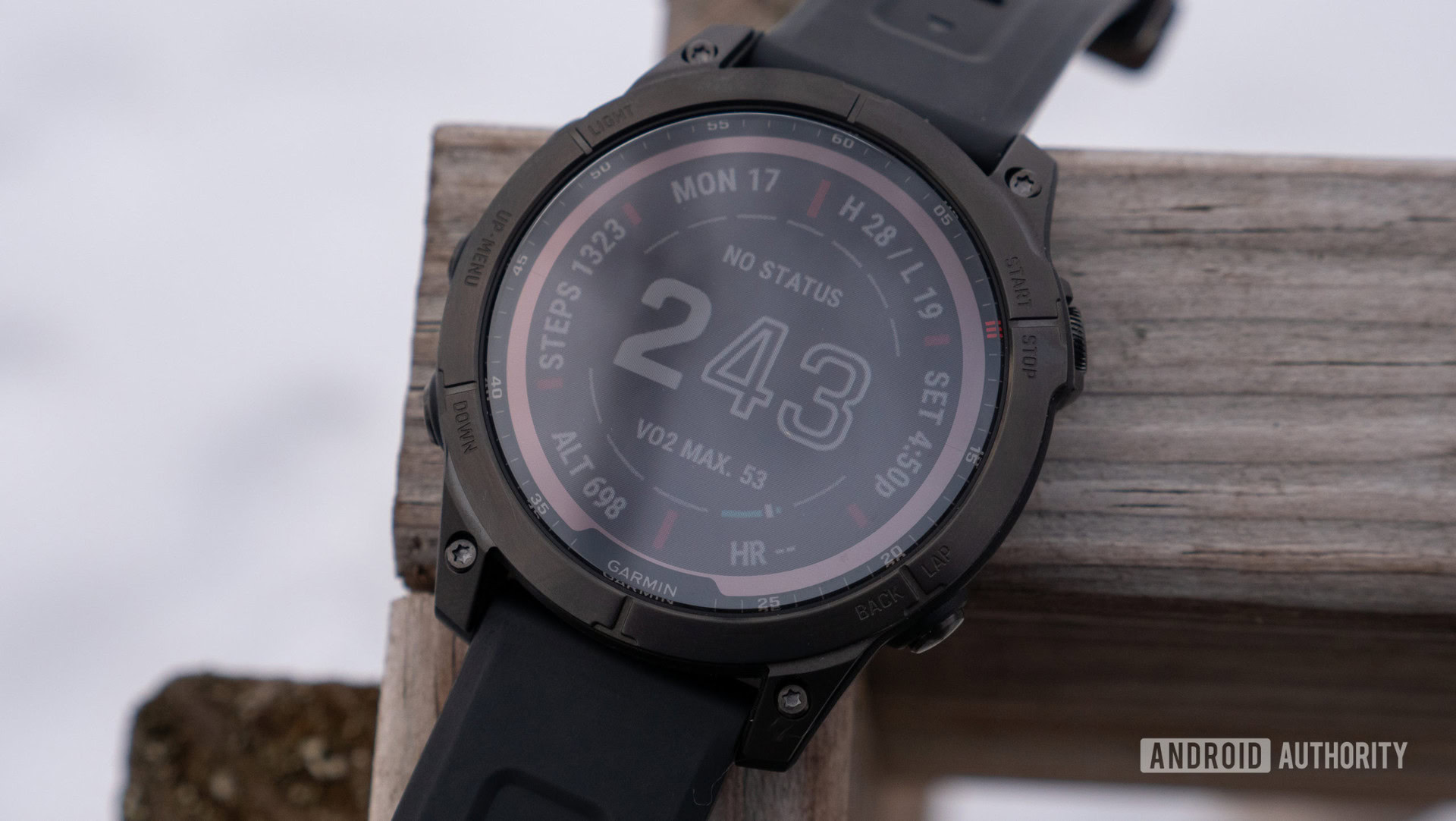
Big changes are coming to the Fenix 7 series. But first, we should talk about all the models Garmin is offering this year.
The Garmin Fenix 7 line will still be available in three sizes: Garmin Fenix 7S (small), Garmin Fenix 7 (medium), and Garmin Fenix 7X (large). The Fenix 7S and Fenix 7 are offered in standard models, solar models, and solar models with sapphire displays. There is no base model Fenix 7X — only a solar model and a solar model with a sapphire display.
The entire Fenix 7 line still has transflective memory-in-pixel (MIP) displays, which offer fantastic outdoor visibility compared to higher-res OLED panels. The big change, though, is that they’re now touchscreens. Unlike the Coros Vertix 2, the Fenix 7 series’ touchscreens can be used throughout all parts of the operating system, whether you’re in an activity, scrolling around a map, or swiping through your widgets.
Thankfully, you can still control the entire device with the five physical buttons as well, but the touchscreen is available if you want to use it. You can also disable the touchscreen at any time by long-pressing the top-right and bottom-left buttons.
Each Fenix 7 size is available with solar-charging capabilities if you want to pay for it. Garmin increased the surface area of the solar-charging panel on the Fenix 7 line, making it more efficient than the solar panels on the Fenix 6 line. The Fenix 7’s solar panels are ~54% larger than the Fenix 6X Pro Solar panels, essentially doubling the solar gains when outdoors in direct sunlight. Battery stats for each model can be found in the specs table below.
Elsewhere, the Fenix 7 line now features reinforced lugs and metal button guards, which should help cut down accidental button presses.
If you opt for the Fenix 7X, you’ll get one of the coolest new features available on the lineup. Both 7X models have a dimmable, multi-LED flashlight built into the top edge of the watch case. A quick double-tap on the display turns on the flashlight. You can use this to see where you’re going at night, stay visible while on the road, or as a replacement for your phone’s flashlight whenever you need it. The flashlight can be set to red or a dimmable white mode. Garmin also developed a strobe mode that matches your running cadence with each arm swing. It’s pretty cool, though I wish it were available on all Fenix 7 models.
GPS and navigation have also been improved on the Fenix 7 line. All Fenix 7 series devices support the L5 frequency range for improved accuracy in areas that are usually challenging for GPS connectivity. All Fenix 7 devices now support Beidou, as well.
Sapphire Solar Fenix 7 devices come pre-loaded with Garmin’s TopoActive maps. You’ll automatically have access to the region of maps where you purchased your device. You can also download global TopoActive maps via Wi-Fi if you plan to take an excursion to another country. Standard and Solar Fenix 7 devices have access to TopoActive maps, but you’ll need to download them manually. All base model Fenix 7s have 16GB of storage, while Solar and Sapphire Solar models have 32GB.
All Fenix 7s are also pre-loaded with SkiView maps and 42,000 golf courses.
Springing for the Sapphire Solar models will get you even more benefits. These higher-end watches come with support for multi-band GNSS, allowing them to receive signals from GPS, GLONASS, Galileo, Beidou, and QZSS systems at the same time. This should result in better overall navigational accuracy.
Also read: How do GPS, GLONASS, and Beidou work in wearables?
That’s about it for hardware — let’s move on to the new software. The Fenix 7 series has two new training features: real-time stamina and visual race predictor.
Real-time stamina is exactly what it sounds like. During a run or a bike ride, you can monitor your exertion levels in real-time. This data is presented in two tiers: potential stamina and current stamina. Potential stamina estimates your overall stamina and will deplete slowly throughout your activity. It will also require a fair amount of recovery afterward. Current stamina estimates how long you can keep running or biking at your current intensity level.
The new visual race predictor feature builds on the race predictor that’s already available on most high-end Garmin watches. Usually, you navigate to a data page that gives you time estimates for certain races like 5Ks, 10Ks, and half-marathons. The visual race predictor is simply a visual representation of this data, displayed in a graph to help you understand what time you’re trending towards for each race type.
Once you’re running or biking in a race, the new Up Ahead feature will hopefully help make the experience go more smoothly. Your Garmin watch will notify you of upcoming aid stations, trails, and next turns during a race. Likewise, you can also set certain information to show on your Fenix 7 at a pre-defined checkpoint to help you manage your race.
For instance, if you’d like to know your last split or upcoming elevation at a certain point in your race, you can set this ahead of time, and your Fenix 7 will notify you once you reach that distance. It’s like a temporary data page to help you plan things out.
More: The best Garmin watch faces for your Fenix, Venu, and more
And finally, Garmin is making it easier to find and download apps and watch faces suited for your device. Previously, downloading things from Connect IQ could only be done through the smartphone app or web interface. Now, Connect IQ On Device lets you see recommended apps right on your watch and download them over Wi-Fi — even if your phone isn’t connected over Bluetooth.
Of course, there are many other features on the Fenix 7 line that were already available for older Garmin watches. These include popular training features like PacePro and Garmin Coach, as well as Garmin’s fourth-generation Elevate heart rate sensor, pulse oximeter, advanced sleep monitoring, Body Battery, Health Snapshot, Garmin Pay, and onboard music storage.
Garmin Epix (Gen 2) series: What you need to know
Ever since the original Garmin Venu, many have been asking for a truly high-end Garmin watch with an AMOLED display. The Garmin Epix is precisely that. Technically, this is the second Garmin Epix, however, it’s completely different from the original that launched in 2015. Garmin told Android Authority it just really liked the name.
Think of the Garmin Epix as a Fenix 7, but with a touchscreen AMOLED instead of a more traditional MIP display. It has all the latest and greatest features available on the Fenix 7 line, including the new real-time stamina and visual race predictor features, Up Ahead, and Connect IQ On Device.
The Epix comes in two models: a base model made of stainless steel, and a Sapphire edition that has a sapphire display (duh) and is made of titanium.
Like the Fenix 7 line, the Sapphire model costs more but also comes with more features. You get increased onboard storage (32GB vs the base model’s 16GB) as well as pre-loaded TopoActive maps. The Sapphire model also has multi-band GNSS support, while the base model does not.
The display is a 1.3-inch AMOLED panel, not unlike the one you’d find on the Garmin Venu series. There are also five physical buttons around the case to control the device without using the touchscreen.
That higher-resolution display does mean the Epix won’t last as long as a Fenix device. Additionally, there’s no solar-powered Epix device. Battery life can last up to 16 days on a single charge in smartwatch mode, or up to 42 hours in GPS mode. Turning the always-on display on drastically reduces battery life down to six days in smartwatch mode and 30 hours in GPS mode.
Finally, although the Epix resembles more of a traditional smartwatch, this is no Venu 2 Plus. There’s no speaker or microphone built into the watch, so it’s incompatible with voice assistants and does not support on-wrist phone calling.
Garmin Fenix 7 series and Epix specs
| Garmin Fenix 7, 7S, and 7X | Garmin Epix (Gen 2) | |
|---|---|---|
Display | Garmin Fenix 7, 7S, and 7X Fenix 7S: 1.2-inch MIP LCD 240 x 240 resolution Fenix 7: 1.3-inch MIP LCD 260 x 260 resolution Fenix 7X: 1.4-inch MIP LCD 280 x 280 resolution | Garmin Epix (Gen 2) 1.3-inch touchscreen AMOLED 416 x 416 resolution |
Input | Garmin Fenix 7, 7S, and 7X Five face buttons Touchscreen | Garmin Epix (Gen 2) Five face buttons Touchscreen |
Lens material | Garmin Fenix 7, 7S, and 7X Base model: Corning Gorilla Glass DX Solar model: Power Glass Sapphire Solar model: Power Sapphire | Garmin Epix (Gen 2) Base model: Corning Gorilla Glass DX Sapphire model: Sapphire crystal |
Dimensions and weight | Garmin Fenix 7, 7S, and 7X Fenix 7S: 42 x 42 x 14.2mm Base and Solar models: 63g (with band) Sapphire Solar model: 58g (with band) Fenix 7: 47 x 47 x 14.5mm Base and Solar models: 79g (with band) Sapphire Solar model: 73g (with band) Fenix 7X: 51 x 51 x 14.9mm Base and Solar models: 96g (with band) Sapphire Solar model: 89g (with band) | Garmin Epix (Gen 2) 47 x 47 x 14.5mm Base model: 76g (with band) Sapphire model: 70g (with band) |
Build materials | Garmin Fenix 7, 7S, and 7X Bezel Base and Solar models: Stainless steel Sapphire Solar model: Titanium Case Base model: Fiber-reinforced polymer with metal rear cover Solar model: Fiber-reinforced polymer with steel rear cover Sapphire Solar model: Fiber-reinforced polymer with titanium rear cover | Garmin Epix (Gen 2) Bezel Base model: Stainless steel Sapphire model: Titanium Case Base model: Fiber-reinforced polymer with steel rear cover Sapphire model: Fiber-reinforced polymer with titanium rear cover |
Battery | Garmin Fenix 7, 7S, and 7X Fenix 7S Smartwatch mode: Up to 11 days / 14 days with solar Smartwatch mode (w/ battery saver): Up to 38 days / 87 days with solar GPS only: Up to 37 hours / 46 hours with solar All satellite systems: Up to 26 hours / 30 hours with solar All satellite systems + music: Up to 7 hours Max battery GPS: Up to 90 hours / 162 hours with solar Expedition GPS: Up to 26 days / 43 days with solar Fenix 7 Smartwatch mode: Up to 18 days / 22 days with solar Smartwatch mode (w/ battery saver): Up to 57 days / 173 days with solar GPS only: Up to 57 hours / 73 hours with solar All satellite systems: Up to 40 hours / 48 hours with solar All satellite systems + music: Up to 10 hours Max battery GPS: Up to 136 hours / 289 hours with solar Expedition GPS: Up to 40 days / 74 days with solar Fenix 7X Smartwatch mode: Up to 28 days / 37 days with solar Smartwatch mode (w/ battery saver): Up to 90 days / 1+ year with solar GPS only: Up to 89 hours / 122 hours with solar All satellite systems: Up to 63 hours / 77 hours with solar All satellite systems + music: Up to 16 hours Max battery GPS: Up to 213 hours / 578 hours with solar Expedition GPS: Up to 62 days / 139 days with solar | Garmin Epix (Gen 2) Smartwatch mode: Up to 16 days (6 days always-on) Smartwatch mode (w/ battery saver): Up to 21 days GPS only: Up to 42 hours (30 hours always-on) All satellite systems: Up to 32 hours (24 hours always-on) All satellite systems + multi-band: Up to 20 hours (15 hours always-on) All satellite systems + music: Up to 10 hours (9 hours always-on) Max battery GPS: Up to 75 hours Expedition GPS: Up to 14 days |
IP rating | Garmin Fenix 7, 7S, and 7X 10ATM | Garmin Epix (Gen 2) 10ATM |
Sensors | Garmin Fenix 7, 7S, and 7X Garmin Elevate heart rate sensor (Gen 4) GPS QZSS GLONASS Galileo Beidou Multi-band GNSS (Sapphire Solar model only) Barometric altimeter Compass Gyroscope Accelerometer Thermometer Pulse ox blood oxygen saturation monitor | Garmin Epix (Gen 2) Garmin Elevate heart rate sensor (Gen 4) GPS QZSS GLONASS Galileo Beidou Multi-band GNSS (Sapphire model only) Barometric altimeter Compass Gyroscope Accelerometer Thermometer Pulse ox blood oxygen saturation monitor |
Connectivity | Garmin Fenix 7, 7S, and 7X Bluetooth Smart ANT+ Wi-Fi | Garmin Epix (Gen 2) Bluetooth Smart ANT+ Wi-Fi |
Storage | Garmin Fenix 7, 7S, and 7X Base model: 16GB Solar and Sapphire Solar models: 32GB | Garmin Epix (Gen 2) Base model: 16GB Sapphire model: 32GB |
Compatibility | Garmin Fenix 7, 7S, and 7X Android, iOS | Garmin Epix (Gen 2) Android, iOS |
Garmin Pay | Garmin Fenix 7, 7S, and 7X Yes | Garmin Epix (Gen 2) Yes |
Smartwatch features | Garmin Fenix 7, 7S, and 7X Connect IQ-compatible Smartphone notifications Text response/reject phone call with text (Android only) Controls smartphone music Plays and controls smartwatch music Find my phone/find my watch Incident Detection LiveTrack | Garmin Epix (Gen 2) Connect IQ-compatible Smartphone notifications Text response/reject phone call with text (Android only) Controls smartphone music Plays and controls smartwatch music Find my phone/find my watch Incident Detection LiveTrack |
Garmin Fenix 7 and Epix alternatives
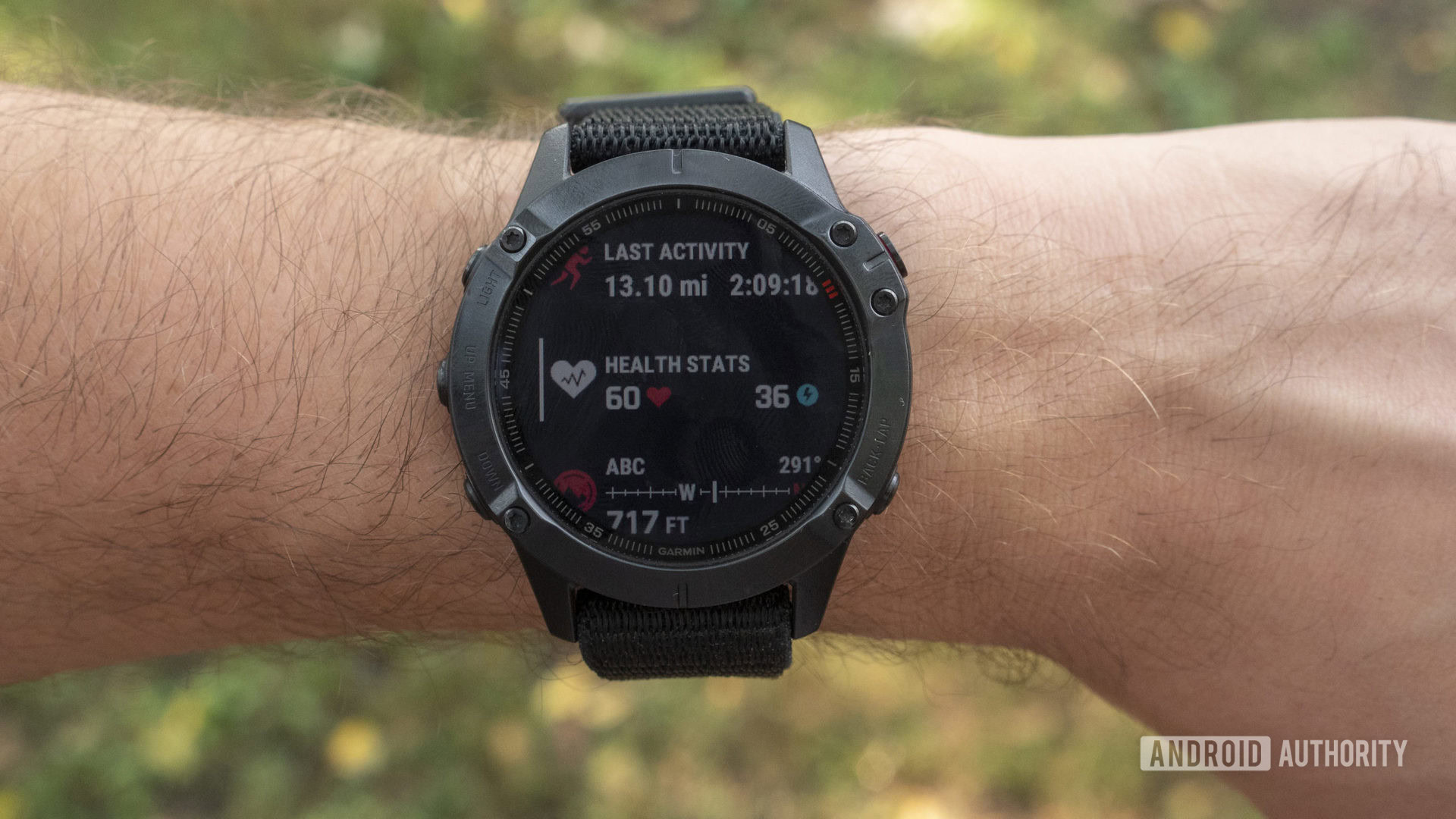
- Garmin Fenix 6 series: Buying last-gen tech is a good way to save some cash and still get most of the features you want. The Garmin Fenix 6 series can often be found on sale for hundreds of dollars less than its launch price.
- Coros Vertix 2: If battery life and GPS accuracy are most important to you, check out the Coros Vertix 2. Coros’ latest outdoor watch isn’t perfect, though it does offer unique features like multi-band GNSS and a battery that can last up to 60 days on a charge.
- Garmin Venu 2 Plus: The Garmin Venu 2 Plus has an AMOLED display, as well as support for your smartphone’s voice assistant and on-wrist phone calls. Though we found it to be an overall solid multisport watch, it’s not as technically capable as the Fenix 7 or Epix.
- Apple Watch Series 7: The Apple Watch Series 7 and Garmin Fenix 7 were made for different users. However, it’s hard not to recommend Apple’s latest, as it is an all-around good smartwatch for sports tracking.
- Suunto 9 Peak and Baro: The Suunto 9 Peak and Baro are the best of what Suunto has to offer. While htey don’t have offline mapping, they have better-than-average battery life and support for onboard music.
Where to buy the Garmin Fenix 7 and Garmin Epix
The Garmin Fenix 7 line pricing starts at $699 and goes all the way up to $999, depending on the size and model you choose. Pricing for each variant is as follows:
- Garmin Fenix 7S: $699
- Garmin Fenix 7S Solar: $799
- Garmin Fenix 7S Solar Sapphire edition: $899
- Garmin Fenix 7: $699
- Garmin Fenix 7 Solar: $799
- Garmin Fenix 7 Solar Sapphire edition: $899
- Garmin Fenix 7X Solar: $899
- Garmin Fenix 7X Solar Sapphire edition: $999
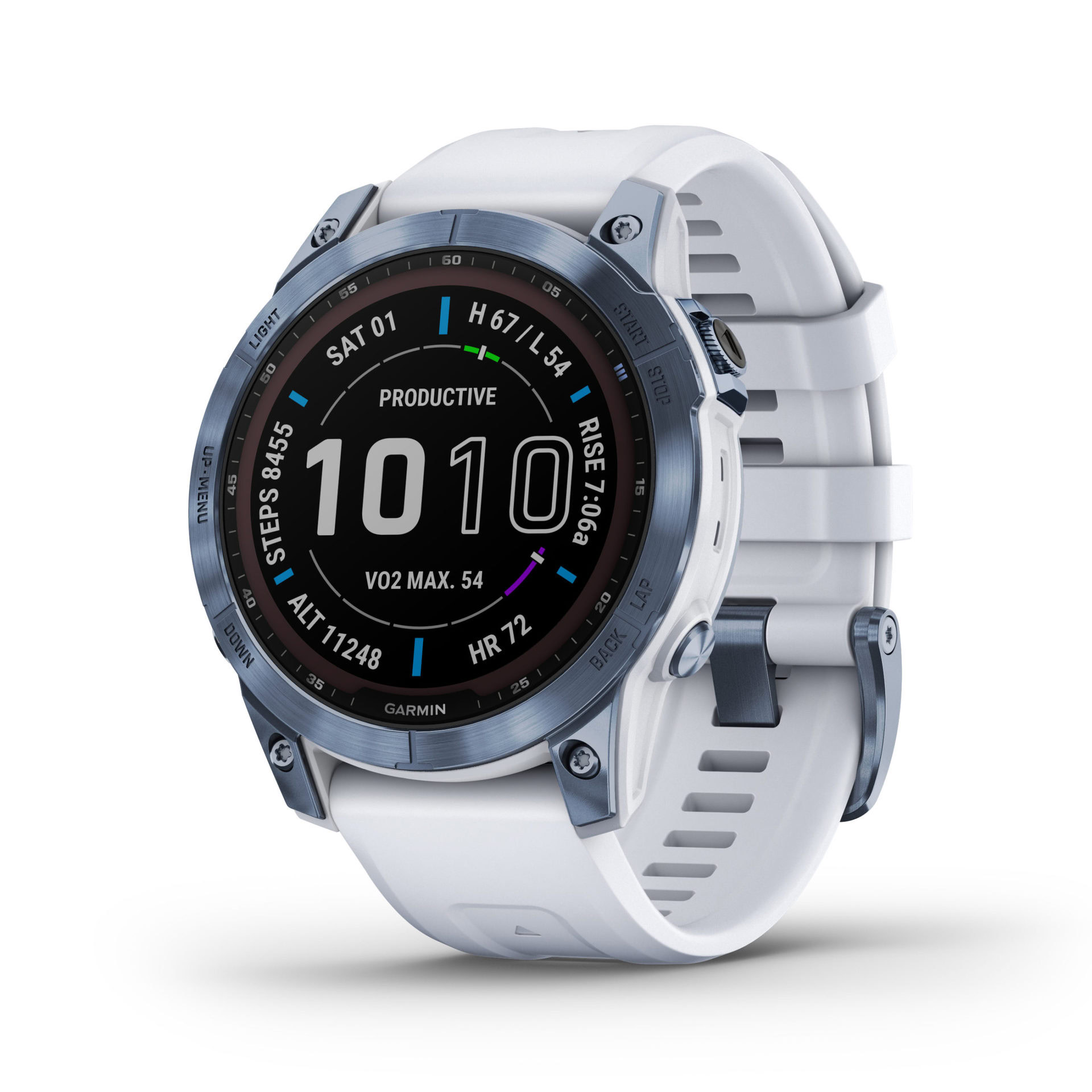
Like the Fenix line, the Epix series costs a pretty penny. See pricing below:
- Garmin Epix (Gen 2): $899
- Garmin Epix (Gen 2) Sapphire edition: $999
The base model Epix is available in Slate Steel, while the Sapphire model is available in Black Titanium and White Titanium colorways. All models are available now from Garmin.com.
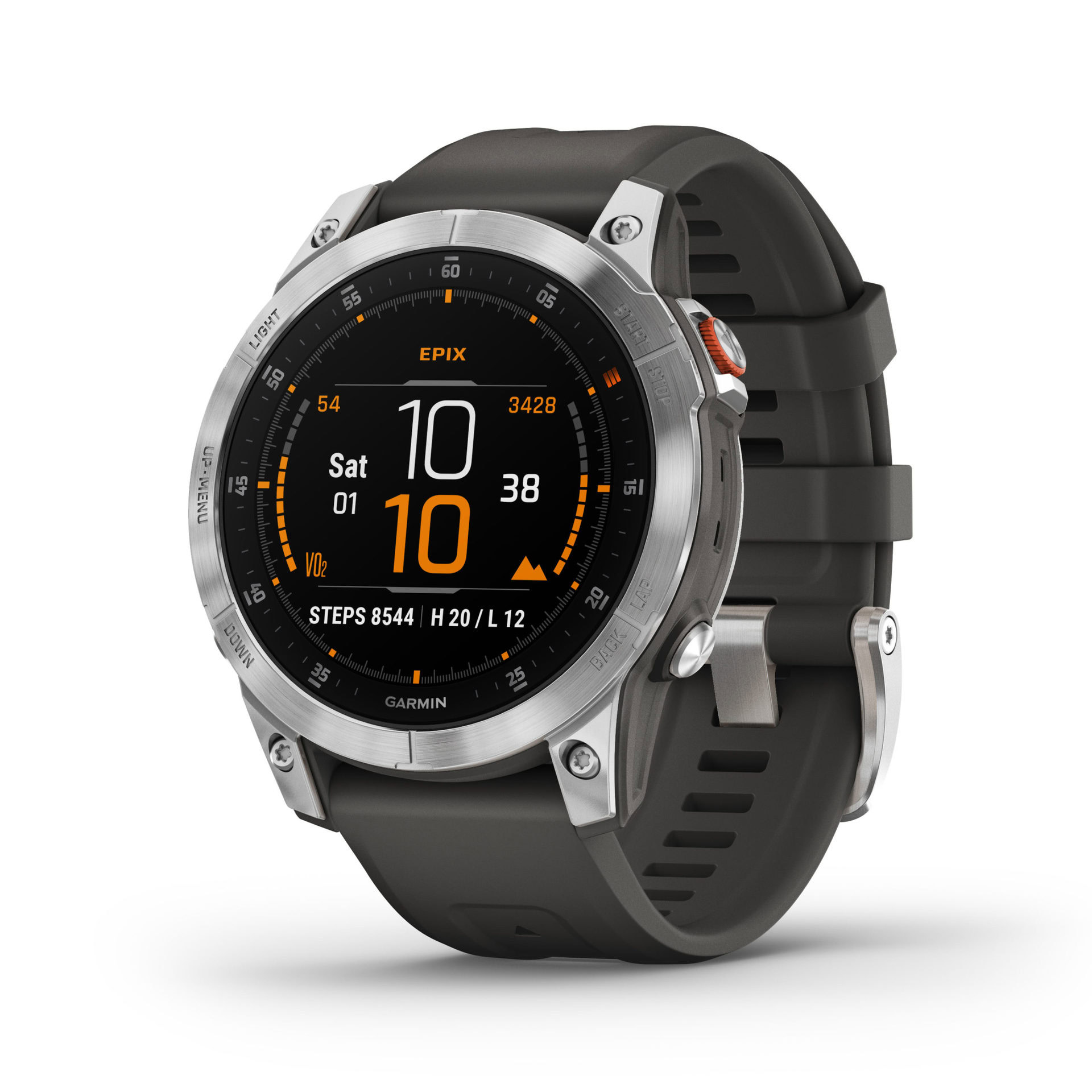
Top Garmin Fenix 7 and Epix questions and answers
Q: Do the Garmin Fenix 7 or Epix have LTE?
A: No, neither the Garmin Fenix 7 nor Garmin Epix have LTE capabilities.
Q: Do the Garmin Fenix 7 or Epix have ECG?
A: No, neither the Garmin Fenix 7 nor Garmin Epix have an electrocardiogram (ECG) monitor.
Q: Do the Garmin Fenix 7 or Epix support voice assistants or on-wrist calling?
A: No. The Fenix 7 and Epix series do not have built-in microphones or speakers, so they’re unable to support Bluetooth calling and voice assistants.
